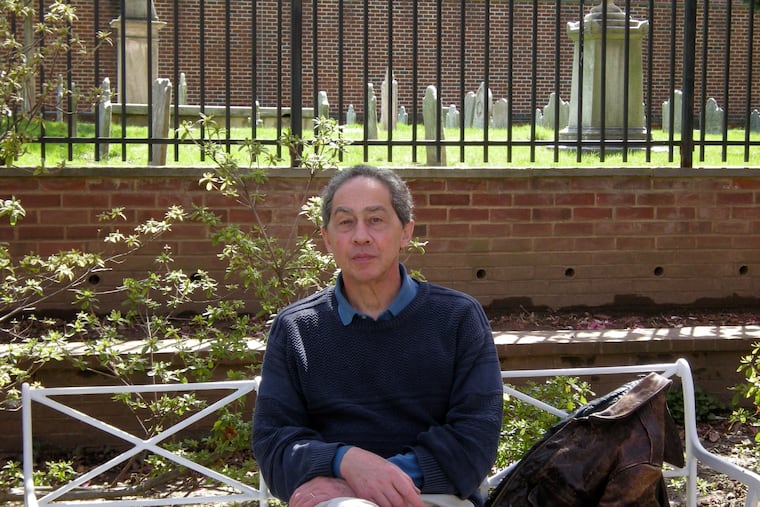Jonathan Kleinbard, 80, Philadelphian who worked to improve University of Chicago’s community relations
Jonathan Kleinbard, a Philadelphian who worked as a news reporter in Pennsylvania and London and served as vice president for community affairs at the University of Chicago for more than 20 years, died October 16 of sepsis.

Jonathan Kleinbard, 80, a Philadelphian who worked as a news reporter in Pennsylvania and London and served as vice president for community affairs at the University of Chicago for more than 20 years, died Wednesday, Oct. 16, of sepsis.
With a passion for social justice and a love of writing, Mr. Kleinbard spent most of his career working to improve the University of Chicago’s relationship with the surrounding Southside community and to aid in neighborhood revitalization. He later did the same in St. Louis for the disadvantaged neighborhood next to the Missouri Botanical Garden.
Born in Philadelphia, Mr. Kleinbard grew up in Rydal in a family of seven. He graduated from Abington Senior High School in 1956. His focus on social justice was influenced by his father, who worked his way through night college and night law school to start a Center City law firm.
“He had this great passion to help people,” said his wife, Joan. “His mother had been an artist, so he had that sensitivity of an artist, but his father’s sense of justice and passion for that.”
Mr. Kleinbard graduated from Kenyon College in 1960 with a degree in English and began working for a local newspaper in Doylestown. The following summer, he wrote a play for a children’s theater program a former roommate had started in Philadelphia. Joan, whose sister was then married to Jonathan’s college roommate, was doing the costumes.
“He was like no one else I had ever met before," his wife recalled. "He had a good sense of humor. He was sort of gruff. But he loved music, he loved art, he loved the theater.”
He was hired by United Press International to report in Philadelphia, then transferred to Harrisburg, and soon after, London, where he began working on the night desk in 1961. Joan soon followed. They returned to Philadelphia and married in 1964.
The couple moved to Chicago after a friend recruited Mr. Kleinbard to go to the University of Chicago’s public relations department. He followed his boss to Washington, D.C., for a brief stint at a nonprofit helping provide breakfast to schoolchildren, then returned in 1971 to the University of Chicago, where he would stay for the next 26 years.
There, Mr. Kleinbard focused on relations with the Woodlawn community, working with local leaders to found community development initiatives, strengthen local public schools, push for affordable housing, and establish relationships with local leaders.
“Much of the progress that has been made has its roots in the work of Jonathan Kleinbard," a group of prominent Chicago community members wrote in a letter to the University of Chicago Magazine in 2006. "[H]e worked tirelessly to lay the foundation for improved relations for the University with the Woodlawn community.”
Friends described him as someone who was a master politician without political ambition, a straight shooter, and a talented negotiator.
Law professor Douglas Baird recalled working with Kleinbard on various initiatives, including a years-long battle with the Department of Housing and Urban Development to rescue a Hyde Park building that still stands today.
“He was one of these indispensable people that kept the university in Hyde Park at a critical time,” Baird said. “Now you come and it’s an incredibly flourishing, vibrant, successful, integrated community. So he was just a miracle worker.”
Bruce E. Clinton, whose company was managing the building Mr. Kleinbard helped rescue, became friends with him as they worked on the project.
“In all the years I lived in Hyde Park, Illinois ... I don’t know another single person that did more to stabilize, to revitalize, to redevelop that community than Jonathan Kleinbard,” Clinton said. "I was, quite frankly, immensely proud of him.”
In 1997, the Missouri Botanical Garden asked Mr. Kleinbard to go to St. Louis to do similar work with the neighborhood surrounding the garden, his wife said.
“His impact on our community is still clearly seen today,” a spokesperson for the Missouri Botanical Garden said. “Jonathan helped lead the efforts to create the Garden District Commission and oversee the redevelopment of the Botanical Heights neighborhood, serving as a catalyst for revitalization.”
Mr. Kleinbard worked with African-American leaders in a city that was “pretty segregated," his wife recalled, insisting that the neighborhood efforts be “led by people from the community. It had to be from the bottom up.”
He worked to raise more than $18 million for the neighborhood near the garden.
When Mr. Kleinbard retired in 2004, the couple returned to Philadelphia to be near their families. Mr. Kleinbard dedicated his time to writing fiction. He loved walking through the city and eating at Reading Terminal Market and the Italian Market. He was involved with his synagogue, Mikveh Israel, and he adored his nieces and nephews.
He and his wife threw dinner parties and took frequent trips to New York and London to see theater and opera, and visit museums.
Shiva began Tuesday, Oct. 22,at 6 p.m. at Congregation Mikveh Israel, 44 N. Fourth St., Philadelphia, PA 19106.
Mr. Kleinbard is survived by his wife, two sisters, and two brothers.
Memorial donations may be made to Mikveh Israel.